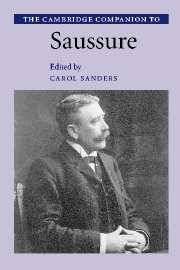Introduction: Saussure today
Published online by Cambridge University Press: 28 May 2006
Summary
Why, still today, do we find the name of Ferdinand de Saussure featuring prominently in volumes published not only on linguistics, but on a multitude of topics, volumes with titles such as Culture and Text: Discourse and Methodology in Social Research and Cultural Studies (Lee and Poynton, 2000), or the intriguing Plastic Glasses and Church Fathers (Kronenfeld, 1996)? It is to this question that the present volume attempts to bring at least a partial answer, by looking afresh at the intellectual background to Saussure's work, the work itself, its impact on European structuralism in general and linguistics in particular, and its changed but continuing influence today.
The titles above, then, are enough to showthat nearly a century and a half after his birth, the ideas of this Swiss linguist and thinker still excite interest. He is best known for his Cours de linguistique générale, edited after his premature death from the notes of students who had attended his lectures and first published in 1916. This ‘Course in general linguistics’ has gone through numerous editions in France, has been translated into numerous languages, and has had an influence far beyond the area of linguistics. This book, however, is far from being the sole reason for his importance as a thinker, the recognition of which has gone through various phases since his death. In his own lifetime, he was regarded – and regarded himself – primarily as a historical linguist who had made his mark with a brilliant and precocious study in Indo-European linguistics.
- Type
- Chapter
- Information
- The Cambridge Companion to Saussure , pp. 1 - 6Publisher: Cambridge University PressPrint publication year: 2004
- 2
- Cited by



